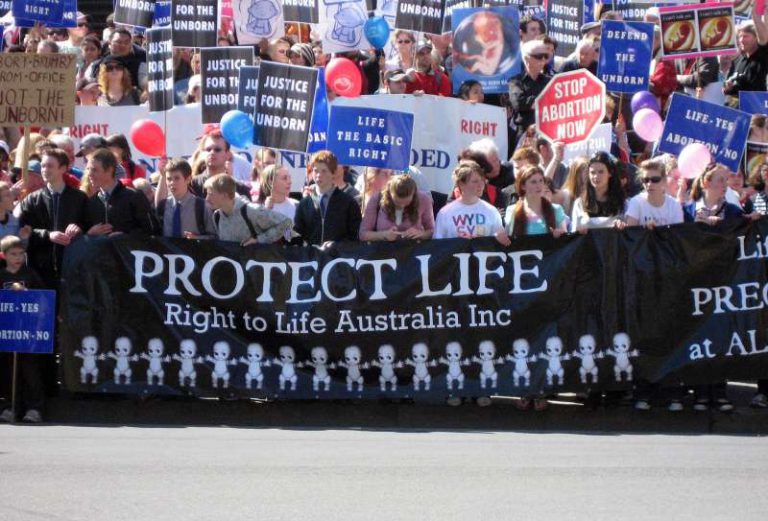Last week Victoria banned anti-abortion protesters from harassing women outside clinics within 150 metres.
The legislation, first introduced by Sex Party MP Fiona Patten, was passed with an overwhelming 31 to eight votes in the state’s upper house.
“We couldn’t live with the thought of subjecting an innocent child to a life of pain and sickness, only to watch it die a few weeks later. Does this make us murderers?”
“Women will no longer be harassed and intimidated around abortion clinics, but no doubt there will be people trying to test the law,” health minister Jill Hennessy stated.
The bill, which will prevent people from filming women entering the clinics and from blocking footpaths, roads and cars around clinics, hospitals and surgeries offering abortions, sees offenders facing fines or jail.
Liberal National party senator Matthew Canavan argued, however, that legislation banning peaceful protest from public areas is an attack on the fundamental right of freedom of speech and its importance in the exercise of public debate.
“I have been harassed whilst entering a clinic two years ago with my husband, to ask for an abortion,” says Marilia, a 28-year-old Greek Australian woman.
“I don’t think people calling you a murderer to your face is freedom of speech.”
“We wanted it [the baby] so much but we were told after the amniocentesis our baby had a condition called Trisomy 18, and that it most likely wouldn’t survive pregnancy or birth. If it did, our lives would be an ongoing suffering.
“My husband did not want to believe it at first, we left the doctor’s office seeking second and third opinions. In the end, we couldn’t live with the thought of subjecting an innocent child to a life of pain and sickness, only to watch it die, a few weeks later,” she tells Neos Kosmos.
“Does this make us murderers?”
Psychologist Vicky Manikas, who happens to be pregnant herself, strongly supports the new laws against the harassment of women or anyone else entering abortion clinics.
“I agree that the decision to have an abortion is one that is not easy and the majority of women and couples struggle when faced with making this choice,” she says.
“I don’t think any woman would find walking into such a clinic easy and would in fact find the process of having an abortion traumatic enough. Being harassed is only adding to their trauma.”
Kay, a Japanese student in Victoria, reflects on her decision often, but is convinced it was the right one. Her first boyfriend, was addicted to ice and started to abuse her.
“My family isn’t rich. I work at a cafe and once I finish my studies I will have to go back home.
“They wouldn’t accept this baby, or me. He did not want us either,” she says, admitting that she will forever carry this weight on her shoulders.
Dr Manikas stresses that the story behind each woman’s decision to terminate a pregnancy could vary from being too young to have a child, having a drug problem which would likely cause serious problems during the development of the foetus, or the child being conceived as a result of violence and rape. These reasons still don’t make the process of going through with an abortion easy.
“As a woman who is currently pregnant, I can only imagine how difficult the decision to terminate a pregnancy would be,” she says.
“Many patients suffer from PTSD following the procedure, as it puts them through emotional and psychological turmoil which remains with them for months or even years,” the psychologist explains.

The abuse and harassment women may encounter outside the clinic limit and impede their legal rights, adding to long-term trauma and emotional turmoil which could lead to depression and even suicidal thoughts. Regardless of our inability to fully understand or empathise with these women, Manikas supports that we can acknowledge their tormented state of mind and respect them.
“We raised our grandson like a son. Our daughter fell pregnant when she was fifteen,” Soula, who follows the Old Julian Calendar, says, adamant “it is a test from God”.
“Abortion is a sin. A baby has a soul from the moment it is conceived and we have no right to take it. It is immoral.”
But, if we choose to believe that an embryo has a soul, then we should pause and wonder if that being, capable of wanting, would knowingly enter this world with spina bifida, AIDS, HIV, Down Syndrome, out of rape or incest. The list is endless.
Dr Manikas agrees that whether and under which circumstances one selects to bring a new life into the world and undertake the responsibility of a sentient being is probably the most important decision a person can make.
Parenting entails a lot of work, dedicated years of patience and support on an emotional, social and financial level while preserving your own physical and mental health. It shouldn’t be subjected to a stranger’s criticism.
*Surnames of the interviewees have been withheld for purposes of anonymity.
For more information and support head to Family Planning Victoria (www.fpv.org.au) and The Royal Women’s Hospital (www.thewomens.org.au)









